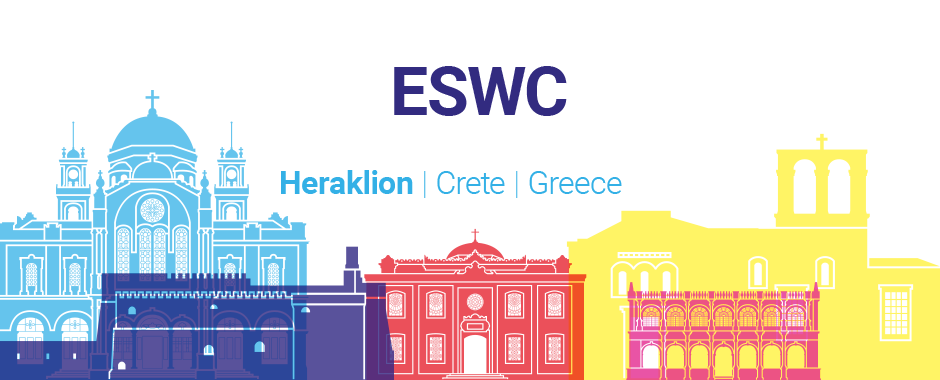Tutorial: Constructing Question Answering Systems over Knowledge Graphs
Organisers: Dennis Diefenbach, Andreas Both and Pierre Maret
Knowledge Graphs are designed to be easily consumed by machines, but they are not easily accessible by end-users. Question Answering (QA) over Knowledge Graphs (KGs) is seen as a technology able to bridge the gap between end-users and Knowledge Graphs. In the last years a lot of research was carried out to solve the problem of QA over KGs, but constructing a QA system over a new KG for non-expert users is still not easy.
The aim of this tutorial is to address this issue. We will show how recently developed technologies, like QAnswer and Qanary, allow constructing, customizing, evaluating, and optimizing QA systems on RDF datasets using a lightweight approach.
Website: https://qanswer.github.io/QA-ESWC2020/
Tutorial: Entity Summarization in Knowledge Graphs: Algorithms, Evaluation, and Applications
Organisers: Gong Cheng, Kalpa Gunaratna and Evgeny Kharlamov
The concise representation format and graph nature of knowledge graphs have resulted in creating many novel Web applications and enhancing existing ones. However, in a knowledge graph, dozens or hundreds of facts describing an entity could exceed the capacity of a typical user interface and overload users with excessive amounts of information. This has motivated fruitful research on entity summarization—automated generation of compact summaries for entities to satisfy users’ information needs efficiently and effectively. Over the recent years, researchers have contributed to this problem by proposing approaches ranging from pure ranking and mining techniques to machine and deep learning techniques. The state of the art has continuously improved and at the same time made it harder for the community and new comers to the problem to keep up with the recent and old contributions in the space. Moreover, even though knowledge graphs are becoming popular among academia and industry, there is no effort to date to educate and discuss on recent trends and basic building blocks of this problem domain. This tutorial specifically aims to fill this gap.
Website: https://sites.google.com/view/entity-summarization-tutorials/eswc2020
Tutorial: Example-based Exploration: Exploring Knowledge through Examples
Organisers: Matteo Lissandrini, Davide Mottin, Themis Palpanas and Yannis Velegrakis
Exploration is one of the primordial ways to accrue knowledge about the world and its nature. As we accumulate, mostly automatically, data at unprecedented volumes and speed, our datasets have become complex and hard to understand. In this context, exploratory search provides a handy tool for progressively gather the necessary knowledge by starting from a tentative query that can provide cues about the next queries to issue.
An exploratory query should be simple enough to avoid complicate declarative languages (such as SQL or SPARQL) and convoluted mechanism, and at the same time retain the flexibility and expressiveness required to express complex information needs. Recently, we have witnessed a rediscovery of the so called example-based methods, in which the user, or the analyst circumvent query languages by using examples as input.
This shift in semantics has led to a number of methods receiving as query a set of example members of the answer set. The search system then infers the entire answer set based on the given examples and any additional information provided by the underlying database. In this tutorial, we present an excursus over the main example-based methods for exploratory analysis. We show how different data types require different techniques, and present algorithms that are specifically designed for relational, textual, and graph data. We conclude by providing a unifying view of this query-paradigm and identify new exciting research directions.
Website: https://data-exploration.ml/eswc2020.html
Tutorial: Modular Ontology Engineering with CoModIDE
Organisers: Karl Hammar and Cogan Shimizu
Modular ontology engineering using ontology design patterns enables non-experts to develop ontologies with reasonable degree of correctness and efficiency. However, the tooling required to fully realize this approach to ontology development, has long been lacking; consequently, comparatively few ontology engineering projects have in fact been carried out using this promising approach. The authors have developed what we believe is the first graphical drag-and-drop-based tool for modular pattern-based ontology engineering, CoModIDE. We will during this tutorial demonstrate CoModIDE and teach the participants to use it. This tutorial is aimed at both novice ontologists (who may directly benefit from having this easy-to-use and freely available tool available, in their own modelling work), and more experienced ontology engineering researchers (who may find the tool useful as an aid in method development and evaluation, or as a teaching aid when introducing ontology engineering to less experienced colleagues).
Website: https://comodide.com/tutorial.html
Share on
